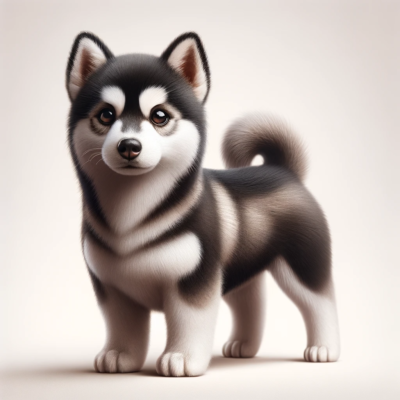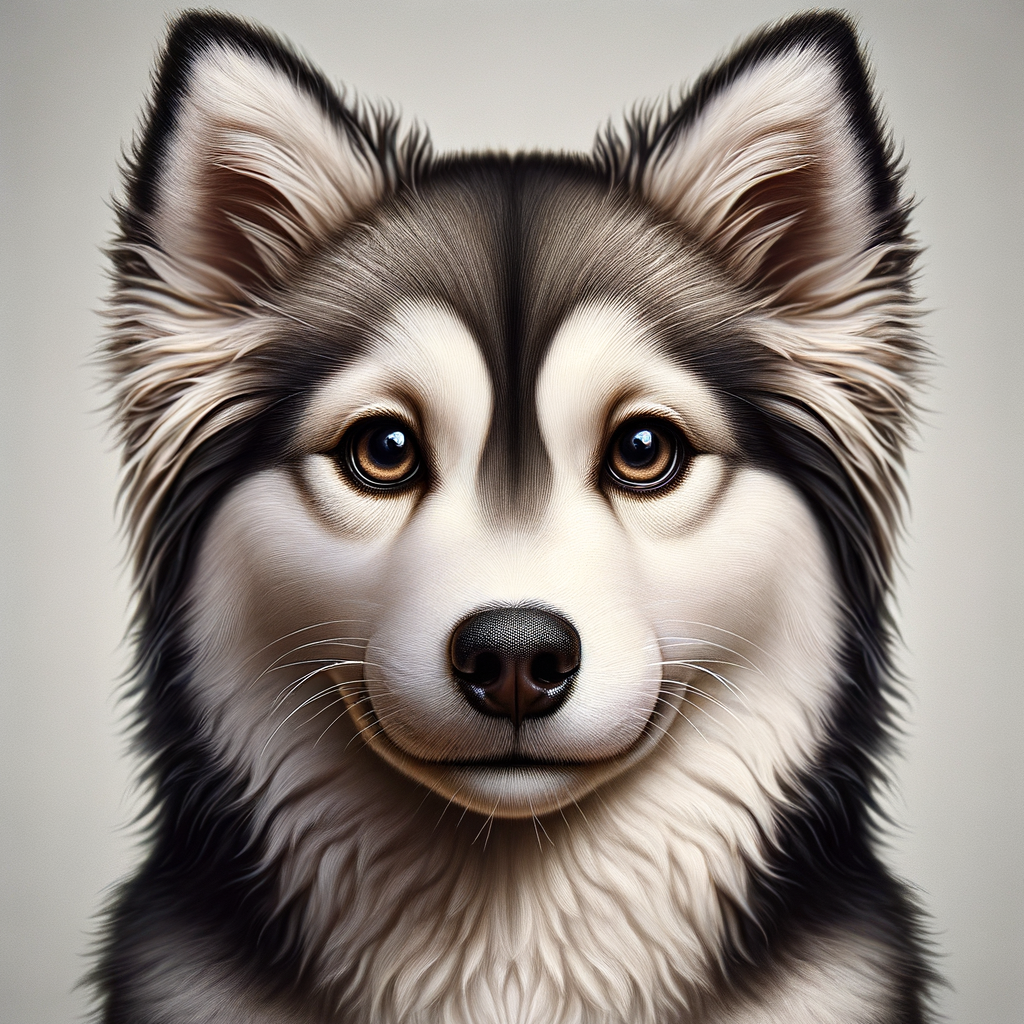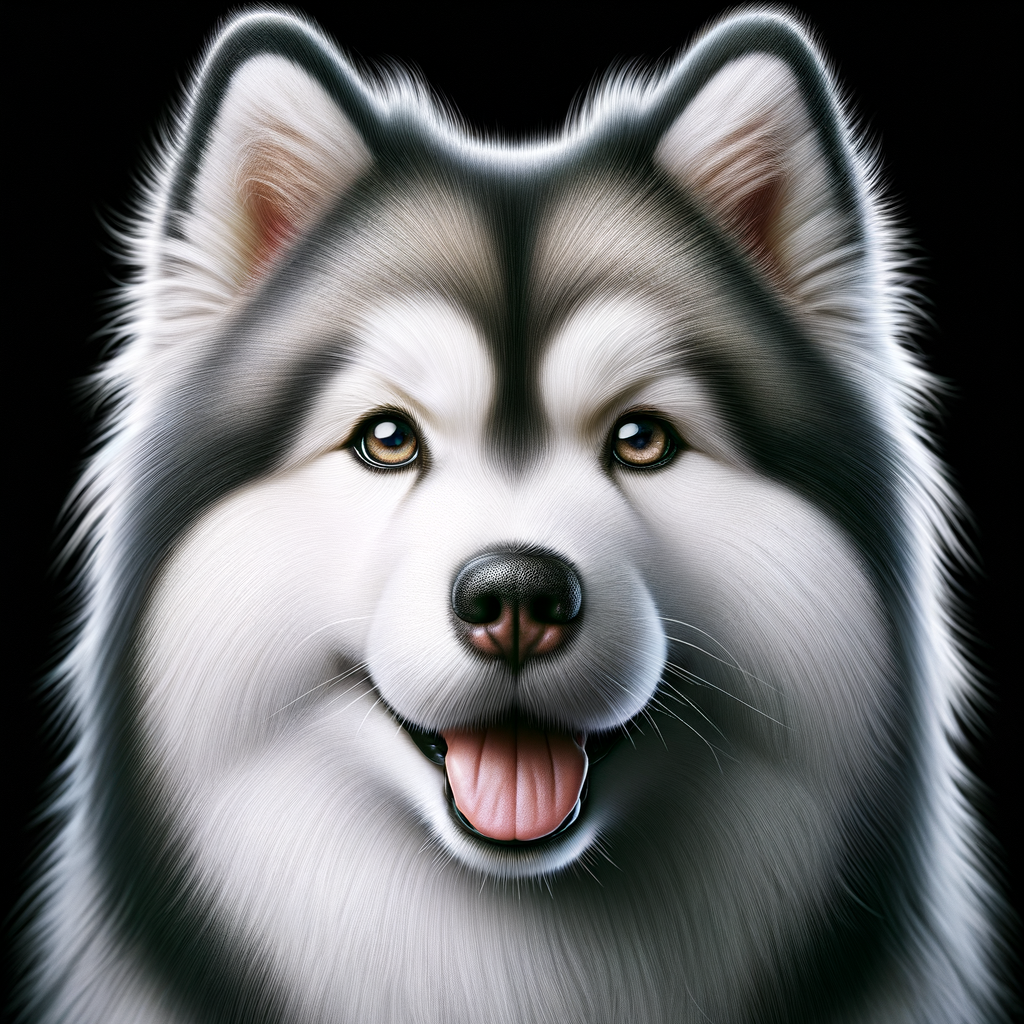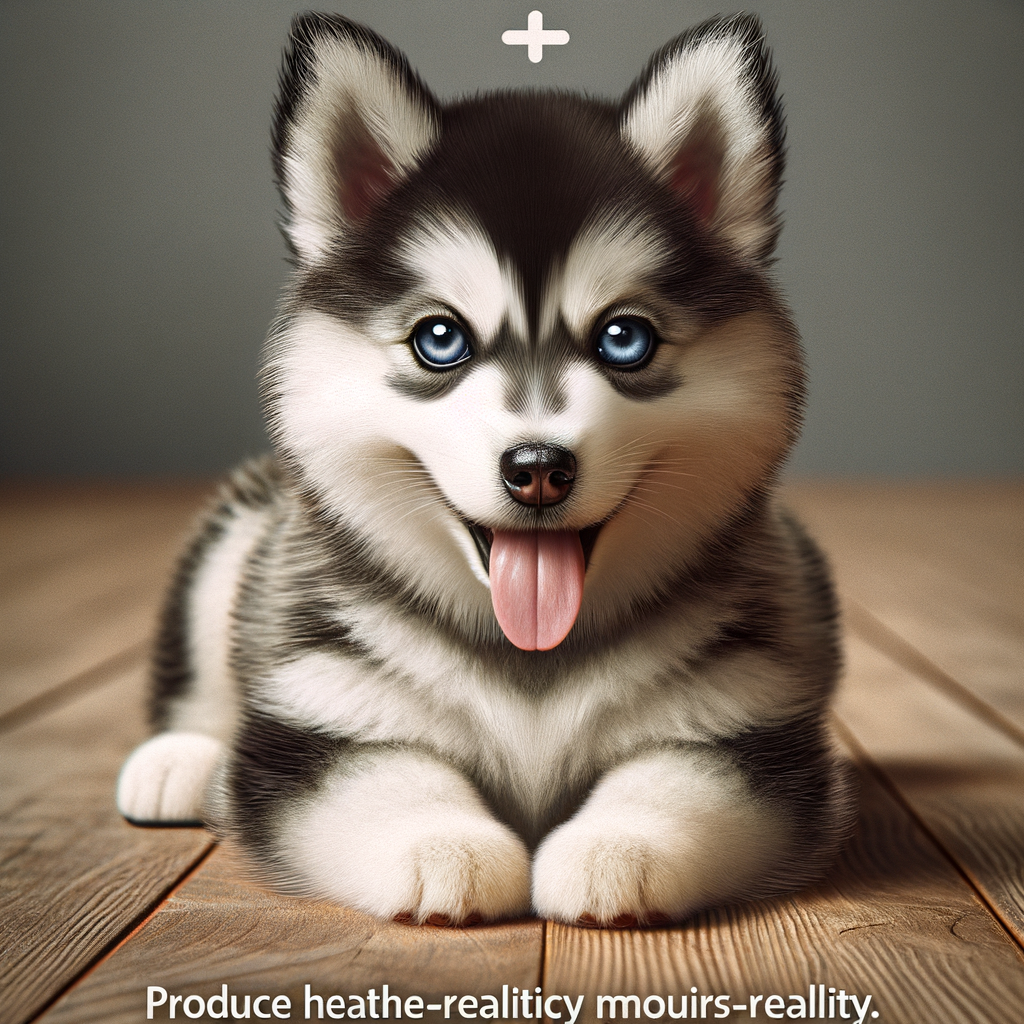Hi there, I’m Dr. Candy, a holistic veterinarian, and today, I’m excited to share more about the charming Miniature Husky. This compact version of the Siberian classic has all the allure of a full-sized Husky but in a smaller, more manageable package. So, whether you’re a potential owner or just an admirer, this comprehensive guide will provide valuable insights into everything you need to know about these delightful little dogs. Let’s dive in!

Unleashing the Temperament of the Miniature Husky
Imagine having a lovable, tiny bundle of energy that is also your best friend. Sounds perfect, right? This dream can become a reality with a miniature husky! They are known for their playful and friendly nature, making them a great addition to any family. But before you make the big decision to introduce a mini husky into your life, it’s important to understand their temperament and how it might blend with your lifestyle.
Is Miniature Husky Family & Kid Friendly?
Without a doubt, miniature huskies are excellent family pets. Their playful and friendly nature makes them great companions, especially for children. They absolutely love to play and can keep your kids entertained for hours. This small husky breed is also very protective, which means they will always stand guard for their family.
However, it’s important to keep in mind that like all dogs, miniature huskies need to be introduced to children gently and supervised until they are comfortable with each other. Always make sure to teach your children how to approach and play with dogs to ensure a positive experience for both.
Energy Level of Miniature Husky
If you’re looking for a dog that can match your energy levels or maybe even surpass them, a miniature husky is the dog for you. These little fur balls are full of energy and require a good amount of exercise every day. They absolutely love going for walks, playing fetch, and participating in agility courses. A bored mini husky can become destructive, so it’s important to keep them mentally and physically stimulated.
Despite their high energy, miniature huskies are also known for their calm demeanor at home. They are quite content to snuggle up with you on the couch after a good play session. They’re great at adapting to their family’s lifestyle and will happily curl up for a lazy day indoors as long as they get their daily dose of exercise.
- Walks: Aim for at least 1-2 walks per day. This will not only help burn off their energy, but it’s also a great bonding activity.
- Playtime: Whether it’s fetch, tug of war, or just running around the yard, playtime is essential for a mini husky’s well-being.
- Training: Mini huskies are intelligent and eager to please, making them great candidates for obedience training or agility courses.
Overall, a miniature husky’s temperament is a perfect blend of playful energy and loving loyalty. Their friendly nature, combined with their energy, makes them great companions for active individuals and families. However, keep in mind that they do need regular exercise to keep them happy and healthy.

Average Lifespan Of Miniature Husky
The miniature husky, a compact version of the Siberian classic, is known for its resilience and vitality. On average, these tiny powerhouses can live between 12 to 16 years, which is quite impressive for a small breed dog. However, just like with any pet, their lifespan can be significantly influenced by their diet and health care practices, including the timing of their spay or neuter procedure.
How Diet Affects Lifespan
The role of nutrition in determining the lifespan of a miniature husky cannot be overstated. Similar to its larger counterpart, the miniature husky is an active breed, requiring a well-balanced diet to support its high energy levels.
A diet rich in high-quality proteins, healthy fats, and complex carbohydrates can help ensure your mini husky maintains a healthy weight and stays active. This breed also benefits from diets fortified with vitamins and minerals to support their immune system and overall health.
It’s worth noting that feeding your miniature husky a poor diet can lead to obesity, which can shorten their lifespan significantly. Obesity in dogs can lead to a host of health problems including heart disease, diabetes, and joint issues. Therefore, it’s essential to monitor your pet’s weight and consult with your vet about the best diet for your miniature husky.
The Holistic Vet’s Perspective of How Spay & Neuter Timing Affects Lifespan
Spaying or neutering your miniature husky is another critical factor that can impact their lifespan. Traditionally, it was recommended to spay or neuter dogs at a young age to prevent unwanted pregnancies and certain health issues. However, recent studies suggest that early spaying and neutering can lead to health problems down the line.
From a holistic veterinary perspective, early spaying and neutering can disrupt normal growth and development, leading to joint and bone deformities. Furthermore, it can also cause hormonal imbalances, which can increase the risk of chronic diseases such as thyroid problems and Cushing’s disease. There’s also an increased risk of certain types of cancers in dogs that are spayed or neutered early.
Given these potential risks, many vets now recommend waiting until your miniature husky has reached physical maturity before considering spaying or neutering. However, it’s always best to discuss this with your vet to determine the best time for your specific pet.
In all, the lifespan of your miniature husky can be significantly influenced by factors within your control, such as diet and the timing of spaying or neutering. By providing a nutritionally balanced diet and considering the best time to spay or neuter your pet, you can help ensure your miniature husky lives a long, healthy, and happy life.
Should You Rescue Or Purchase A Miniature Husky?
When it comes to bringing a miniature husky into your home, you have two main options: rescuing or purchasing. Both options have their own unique benefits and should be carefully considered.
Benefits of Rescuing or Adopting
Choosing to rescue or adopt a miniature husky can be a rewarding experience. Not only are you giving a dog a second chance at a happy life, but you’re also making a stand against puppy mills and unethical breeding practices.
Rescue dogs often come with a wealth of love to give. They may have had a tough start in life, but with patience and care, they can blossom into loyal and loving companions.
Adopting from a shelter also comes with practical benefits. Most rescue dogs are already spayed or neutered, and up-to-date on their vaccinations. This can save you time and money in vet bills.
Additionally, you’ll have the satisfaction of knowing that you’ve made a difference in a dog’s life. There’s nothing quite like the bond between a rescue dog and their forever family.
Benefits of Buying
On the other hand, purchasing a miniature husky allows you to have more control over the dog’s early upbringing. This can be particularly important if you have specific requirements, such as wanting a puppy to train from a young age, or needing a dog with a known health history.
When you buy a miniature husky from a reputable breeder, you’ll usually receive documentation about the dog’s lineage, health screenings, and any potential genetic conditions. This information can be invaluable in predicting your dog’s future health and temperament.
Moreover, buying a puppy gives you the opportunity to socialize them from a young age. This is crucial in shaping a dog’s behavior and ensuring they grow up to be well-rounded adults.
However, it’s important to remember that buying a dog should never be an impulse decision. It requires careful research to find a responsible breeder who prioritizes the health and wellbeing of their dogs over profit.
In conclusion, whether you choose to rescue or purchase a miniature husky, you’re in for a wonderful journey. These compact versions of the Siberian classic are known for their playful nature, striking appearance, and loyal companionship. Just remember to make your decision with care, considering not only your own needs and lifestyle, but also the wellbeing of the dog.

Average Cost For A Miniature Husky
The average cost of a miniature husky, also known as an Alaskan Klee Kai, can vary significantly depending on various factors such as the breeder’s reputation, the puppy’s lineage, and its unique characteristics. Typically, you can expect to pay anywhere between $1,500 to $3,000 for a miniature husky puppy. However, some puppies from champion bloodlines can cost even more.
Average Cost
Let’s break down the cost a bit further:
- Puppy Price: As mentioned, the initial price for a miniature husky puppy ranges from $1,500 to $3,000.
- Veterinary Expenses: Initial vet expenses, including vaccinations and microchipping, can cost around $100 to $300.
- Spaying/Neutering: The cost of spaying or neutering your miniature husky can range from $200 to $500.
- Supplies: Initial supplies for your new puppy, including a crate, leash, toys, and food, can cost around $200 to $500.
- Training: Basic obedience classes can cost around $100 to $200.
So, the total first-year cost can be around $2,000 to $4,500, depending on various factors. It’s essential to consider these costs before bringing a miniature husky into your home.
What To Look For In A Breeder
When it comes to choosing a breeder to purchase your miniature husky, it’s crucial to do your research and ensure that the breeder is reputable. Here are some things to consider:
- Health Testing: A reputable breeder will conduct health testing on their breeding dogs to ensure that they are free from genetic diseases that could be passed on to the puppies.
- Environment: The puppies should be raised in a clean, safe, and stimulating environment. Avoid breeders who keep their dogs in poor conditions.
- Knowledge: A good breeder should be knowledgeable about the miniature husky breed and be able to answer any questions you have about the breed’s temperament, health, and care requirements.
- References: Ask for references from previous customers. This can give you an idea of the breeder’s reputation and how they treat their dogs and customers.
Remember, a miniature husky is a significant investment, both financially and in terms of time commitment. Therefore, it’s essential to make sure you’re getting a healthy, well-bred puppy from a reputable source.
Training & Behavior Of Miniature Husky
If there’s one thing that makes the miniature husky stand out, it’s their high intelligence. These dogs are known for their quick learning abilities, but that doesn’t mean they don’t need proper training. In fact, their intelligence can sometimes make them a bit stubborn, so it’s important to approach training with patience and consistency.
Overall Trainability
Training a miniature husky can be a bit of a challenge due to their independent nature. They’re intelligent enough to quickly grasp what you want them to do, but they also have a tendency to want to do things their own way. Positive reinforcement methods work best for this breed, as they’re motivated by praise and rewards. Be prepared for plenty of repetition, and remember that patience is key.
Crate Training Is Recommended And Why
Crate training is highly recommended for miniature huskies. Not only does it provide a safe, personal space for your dog, but it also helps with housebreaking and preventing destructive behavior when you’re not home. A crate can become a comfortable den for your dog, where they feel secure and relaxed.
Here’s a tip: start crate training when your mini husky is still a puppy, as they tend to be more adaptable at this age. Make sure the crate is a positive place for them – never use it as punishment. Make it comfortable with a soft bed and favorite toys, and reward your dog for going into the crate.
Potential Negative Behaviors To Watch For With Miniature Husky
Miniature huskies, like their larger counterparts, are known for being quite vocal. They’re prone to howling and barking, which can become an issue, especially in apartment living. Training them to understand when it’s appropriate to bark can help mitigate this behavior.
Another potential negative behavior is their tendency to be a bit of an escape artist. These dogs are curious and adventurous, and if given the chance, they might try to venture beyond your yard. Ensuring your yard is securely fenced and monitoring your dog while they’re outside can help prevent escape attempts.
Finally, miniature huskies can exhibit destructive behavior if they’re bored or not getting enough exercise. This can range from chewing on furniture to digging up your garden. Regular exercise and mental stimulation can help keep these behaviors at bay.
Remember, training a miniature husky takes time and patience, but the reward is a well-behaved, loyal companion who’s a joy to be around.

Grooming Requirements For Miniature Husky
Are you a proud parent of a miniature husky? If so, you’re probably familiar with their double-coat fur, which is as beautiful as it is demanding. Let’s delve into the grooming requirements you need to consider.
What About Shedding
Just like their larger Siberian husky counterparts, the miniature husky has a dense double coat that sheds—quite a bit! This is something husky parents have to deal with twice a year, typically during the spring and fall seasons. During this time, the breed goes through a phase called ‘blowing coat’, where they shed their undercoat to prepare for the changing seasons. So, you can expect to see fur – lots of it!
Regular brushing is your best defense against the miniature husky’s shedding. It keeps the coat healthy and reduces the amount of fur that ends up on your furniture. A good deshedding tool and a slicker brush are must-haves for any miniature husky parent. Brush your mini husky at least once a week, or more frequently during the shedding season. Keeping up with this routine will help prevent mats and tangles, and keep your pup looking their best.
Excessive Shedding May Be Due To Nutrition
While shedding is normal for a miniature husky, excessive shedding might be a sign that something else is going on. Poor nutrition can often lead to a dry, brittle coat that sheds more than usual. A balanced diet that includes the right amounts of proteins, fats, and certain nutrients can significantly improve your dog’s coat health.
It’s important to remember that not all dog foods are created equal. Some cheaper options might not provide the complete nutrition that your dog needs, leading to problems like excessive shedding. Look for high-quality dog foods that list a source of animal protein, like chicken or beef, as the first ingredient. A diet rich in Omega-3 and Omega-6 fatty acids can also promote a healthier coat and reduce shedding.
Of course, it’s always a good idea to consult with a vet if you notice any changes in your dog’s coat or shedding patterns. They can help you rule out any underlying health issues and give you personalized advice for your pup’s diet.
But remember, nutrition isn’t just about food. It’s a holistic approach that includes a healthy lifestyle, regular exercise, and plenty of love and care. We’ll dive deeper into the topic of nutrition and diet in the next section of this guide on the miniature husky.
Health Of Miniature Husky
Overall Health
If you happen to be a proud owner or planning to get a miniature husky, you can take comfort in knowing that these adorable canines generally have good overall health. Being the compact version of the Siberian classic, they inherit the robustness of their larger counterparts. However, like any breed, they do come with their own set of health concerns that need to be addressed to ensure they live a happy and healthy life.
As a responsible dog parent, ensure your mini husky gets regular check-ups and vaccinations. This will help in early detection of any potential health issues. Regular exercise and a balanced diet also play a crucial role in maintaining their overall health. Remember, a healthy miniature husky is a happy miniature husky!
Potential Health Conditions
While the miniature husky is generally healthy, it’s essential to be aware of certain health conditions that this breed is predisposed to. Here are some of the potential health conditions to keep an eye out for:
- Eye Conditions: Miniature huskies are susceptible to various eye conditions including cataracts and progressive retinal atrophy (PRA). Regular eye checks can help in early detection and treatment.
- Hip Dysplasia: This is a common condition in many dog breeds, including the miniature husky. This condition can cause discomfort and mobility issues, so it’s important to ensure your mini husky gets regular exercise and maintains a healthy weight.
- Heart Disease: Like their larger counterparts, miniature huskies can also be prone to certain heart conditions. Regular vet checks can help monitor your dog’s heart health.
Remember, these are potential health conditions that your miniature husky might face, but it does not mean they will definitely suffer from these. Regular vet visits, a balanced diet, and plenty of exercise will go a long way in keeping your miniature husky healthy.
Concluding Thoughts
Taking care of a miniature husky’s health might seem daunting at first. But remember, with the right care and attention, these adorable furballs can lead a long, healthy, and happy life. Regular vet check-ups, a balanced diet, and proper exercise regimen are crucial in maintaining their overall health and mitigating the risk of potential health conditions.
Being aware of the potential health risks that a miniature husky might face is the first step towards preventing them. By staying vigilant and proactive in your miniature husky’s health, you can ensure they will live a life full of tail-wags, belly rubs, and love!
Remember, every miniature husky is unique and has its own needs. Always consult with your vet if you notice any changes in your dog’s health or behavior. After all, the health of your miniature husky is not just about their physical well-being, but their happiness and quality of life too.
Nutrition & Diet For Miniature Husky
When it comes to miniature huskies, it’s important to remember that their diet plays a crucial role in their overall health. Just like us, these small-sized bundles of joy need a balanced diet to thrive and stay healthy. Here are some nutrition tips from Dr. Candy, a qualified vet with a love for huskies!
Nutrition Tips From Dr. Candy
According to Dr. Candy, the diet of a mini husky should be rich in protein and contain adequate amounts of carbohydrates, fats, vitamins, and minerals. Here are her top tips:
- High-Quality Protein: This should be the primary component of your mini husky’s diet. A diet rich in animal proteins like chicken, beef, or fish helps support their muscle development and overall growth.
- Fruits & Vegetables: Fruits and vegetables provide essential vitamins and minerals. They also contain antioxidants that boost the immune system and fight against diseases.
- Healthy Fats: Healthy fats like omega-3 and omega-6 fatty acids are essential for your mini husky’s coat and skin health. They also support brain development and overall cell function.
- Hydration: Hydration is as important as nutrition. Always make sure your mini husky has access to fresh, clean water.
Best Foods For Miniature Husky
Deciding on the best food for your toy husky can be a challenge with so many options available in the market. Dr. Candy recommends a mix of dry and wet food for balanced nutrition. Here are some top picks:
- Dry Food: Choose a high-quality, protein-rich dry food that is specially formulated for small breeds. Some good options include brands like Blue Buffalo, Wellness CORE, and Orijen.
- Wet Food: Wet food is a great way to provide hydration and can be mixed with dry food for a tasty meal. Look for options that are free from preservatives and artificial colors.
- Homemade Food: If you choose to cook for your mini husky, make sure the meals are balanced. Incorporate lean proteins, vegetables, and grains. Consult with a vet or a canine nutritionist to ensure you’re meeting your dog’s dietary needs.
Remember, every dog is unique and what works for one might not work for another. It’s always a good idea to consult with your vet before making any significant changes to your dog’s diet.
Our little fur-friends deserve the best! Providing your miniature husky with a balanced diet will not only keep them healthy and happy, but it’ll also contribute to their longevity. After all, a healthy dog is a happy dog. So, let’s make sure we’re giving our mini huskies the best nutrition possible for them to live their best lives!
Frequently Asked Questions
What is a Miniature Husky?
A Miniature Husky is a smaller version of the classic Siberian Husky. They are bred to maintain the same appearance and temperament of a Siberian Husky but in a smaller, more manageable size.
How big do Miniature Huskies get?
Miniature Huskies typically grow to be between 12 to 16 inches tall at the shoulder. They usually weigh between 15 to 35 pounds, making them significantly smaller than their full-sized counterparts.
What is the lifespan of a Miniature Husky?
Miniature Huskies typically live between 12 to 14 years. This can vary based on a variety of factors including diet, exercise, and overall health care.
Do Miniature Huskies have the same temperament as Siberian Huskies?
Yes, Miniature Huskies are known to have the same playful, energetic, and friendly temperament as Siberian Huskies. They are also known for their intelligence and independence.
How much exercise do Miniature Huskies require?
Miniature Huskies are very active and require a lot of exercise. They should have at least an hour of vigorous exercise each day, along with plenty of mental stimulation.
Dr. Candy, a holistic veterinarian and certified raw dog food nutrition specialist, graduated from Oklahoma State University in 2009 with a DVM and has since specialized in companion animal nutrition, advocating for species-specific diets. With a background in wildlife rehabilitation and oil spill response, she combines holistic health and conventional medicine in her unique approach to treating chronic diseases, allergies, and autoimmune conditions in pets. As the owner of a veterinary practice in Colorado and an author, Dr. Candy is dedicated to educating pet parents and improving the health and happiness of animals.




